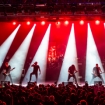Nope. Contrary to some believers, Periphery guitarist Misha Mansoor didn't come up with the prog-metal subgenre name of djent. "Meshuggah did," he clarifies. "It was the onomatopoeia of them trying to describe their very metallic palm-mutes that they were chasing."
The term started getting thrown around online in the mid-Aughts, and a young Mansoor ran with it. When he'd post his early demos, he'd describe the clips as "djenty," tongue planted firmly in cheek. Soon, many fans began using djent to refer to the style of music played by bands like Periphery, the outfit Mansoor founded in Washington, D.C. circa 2005. "I initially tried to tell people, 'Hey guys, djent's not a genre.' But no one listened because you can't tell anyone anything on the internet." Almost 20 years later, Mansoor seeks to correct the matter by naming his band's new and seventh album, Periphery V: Djent Is Not a Genre. "It probably won't," he says with a shrug.
Regardless, the record slams. Tracks like "Wildfire" showcase Periphery's gift for meshing the gnarly and textural. Other highlights include the panoramic pummeling of "Wax Wings." Six of the album's nine cuts clock in at seven minutes plus, including the 12-minute "Dracul Gras," which evokes previous string-swept epics like "Marigold" and "Reptile." Although the pandemic-protracted sessions were "demoralizing at times" as the band struggled to write songs that they "believed in," Mansoor says Periphery V "is probably the album I'm most proud of." With a sense of humor about its subtitle, the upbeat and thoughtful Mansoor gave Revolver his picks for the 10 essential djent albums that make up this genre … that is not a genre.
Meshuggah - Destroy Erase Improve
I don't want to rank these — that would be very, very difficult. I'm gonna say these are seminal moments in djent history, if you will. And, to me, this really begins with Destroy Erase Improve. A lot of people would argue that the [1994] None EP is where they really started to figure out that sound. But Destroy Erase Improve is a [new] level of refinement. It is an album that sounds phenomenal to this day. It's so ahead of its time it's actually scary. Probably one of the most important albums in metal history.
After the Burial - Rareform
They're probably one of the first bands that I was aware of that was a signed, touring band that took to eight-string guitars. It was really interesting because they had this sort of melodeath vibe to them. It was almost like they were a melodeath band that discovered Meshuggah, and they're like, "Let's fuse the two together." So there's a lot of really melodic, European-sounding things and then there's a lot of straight-up Meshuggah sections. I remember hearing "Aspiration" for the first time and that superlong pattern with the drums at the end; that part gives me chills.
Meshuggah - Chaosphere
My favorite Meshuggah album — and one of my favorite albums of all time. One of the weirdest, quirkiest albums and mixes. The album name is appropriate because it's just pure chaos from beginning to end. They always do these tracks with clean guitars just as a palate cleanser, and they opted not to do that, and I love it for that. This album is perfect. They kind of chose a path. Because Destroy Erase Improve got very proggy and this album is insanely heavy — and it's only insanely heavy. It showed a much darker side of them that I feel was like a fork in the road.
Animals As Leaders - Animals As Leaders
I don't know if this one's a little self-sucky because I did write and produce it with Tosin [Abasi, Animals as Leaders guitarist/founder]. But I think it's a really important album. I think Tosin is one of those brilliant musicians and he's got such a unique approach to guitar. He's one of my best friends, so I am biased. But I think when we created it, it was really special. And we weren't even trying to create anything special at the time — it was just fun, writing with your friend.
Tesseract - One
When I was coming up, I was on a bunch of forums, Meshuggah being one of them. You'd see a lot of the same names on these forums: Browne from Monuments, Acle from TesseracT, Paul Ortiz aka Chimp Spanner; these are some of the heavy hitters that would be posting their songs on the forum. It's what got me being like, "Maybe I should start posting my songs, too." Although my stuff sucked compared to theirs, they gave me the motivation to work harder and be better. One was like TesseracT's mission statement. This is Acle's thing, his brain and where this is going. It's pretty damn genius and sounds amazing live.
Textures - Drawing Circles
I was obsessed with Meshuggah and consumed everything that they had up to that point. And then what happens? You want more, so you start looking for bands that sound like them. Unfortunately, back then there wasn't really a djent scene and there weren't really a lot of bands that sounded like that — besides the crappy demos I was doing and the people on the forum. But there were no bands. And Textures was one of the first bands where I was like, Oh, these guys are trying to do something in that vein but with their own twist.
Meshuggah - Nothing
Nothing is probably the most important album for what we would call djent. And this is why I have three Meshuggah albums in this list. I know it seems excessive, but this is how important Meshuggah is. The story goes that they wanted to do an album just on bass guitars. And they had a buddy that was like, "Well, I could make an eight-string guitar with the low strings, and you could still be able to play solos on it." And thus, the eight-string was born. Nothing has so much charisma and the songs are so good. So many moments that if you see it live you just lose it.
Sikth - Death of a Dead Day
What a heavy hitter. This album changed my life. This was like a modern Dream Theater moment where you're like, "You can't really play this, right?" And they're flawless live. I'm always shocked at how people are not as familiar with this album. If you listen to it, you'll probably hear how it's influenced us. It's so extremely technical but it's so energetic and has so much to say. The lesson I learned from this album is that it's so much more compelling when the conversation is, "Wow, what a great song. And oh my god, by the way, that's really hard to play." And Death of a Dead Day is that.
Chimp Spanner - At the Dream's Edge
Chimp Spanner is a musical genius. Everyone in this scene, they're all extremely talented. But Paul Ortiz was — I think we had all agreed on the forums — on a different level; and to this day still is. He has freakish levels of talent. His musical ear is unreal; his guitar ability, engineering and mixing, everything. This album is kind of like stylized versions of songs you'd hear on the forums. It's absolutely perfect from beginning to end — and that dude made it in his bedroom. If you haven't heard this album before, I'm almost jealous that you get to hear it for the first time.












